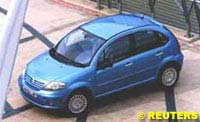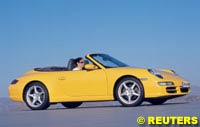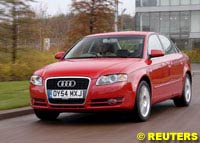

Automotive News and Reviews for the Petrolhead
In this week's issue:
- Car Briefs
- Switch to Ultra Clean Fuels Delayed
- Peugeot, Toyota Announce Three New Models
When testing the vehicle in Paris, Citroen engineers recorded a 15% reduction in urban fuel consumption, while British motoring magazine managed a 27% improvement in one test. Savings will vary journey by journey depending on the level of congestion and the amount of time the car spends stationary during a particular trip, which research showed can be as high as 30% of the time.
The system stops the engine a split second before the car comes to a standstill and then restarts it in 0.4 seconds the moment the driver takes their foot off the brake pedal, allowing the driver to accelerate away as normal.
The recommended retail price is £11,445, which is reduced by the availability throughout December of a £1,500 cashback offer.
Mechanically the Cabrio is identical to the Coupe, being available as either the Carrera with 325 bhp (177 mph) or the Carrera S with 355 bhp (182 mph). The roof opens and closes automatically in 20 seconds, with the outer side of the roof facing upwards for optimum protection of the heated glass rear window. The roof can be opened and closed while driving at speeds of up to 50 km/h (31 mph).
The Porsche 911 Carrera Cabriolet will be priced at £65,260 and the 911 Carrera S Cabriolet at £72,230 and will be available in the UK from 9 April 2005.
It will come as a surprise to Europeans that Ford US was focused on the environment in the first place: it is a company dependent for its very existence on gas-guzzling Sport Utility Vehicles, some of which have fuel consumption close to single figures. Ford does have one factory that boasts the world's largest living roof - there is a garden on top of the plant that absorbs CO2 and emits oxygen - but it is what comes out of the factory that counts.
Bill Ford's target is to reduce greenhouse gas emissions of his US cars by 50% by 2030. To put that into perspective, European manufacturers, whose models already have far lower greenhouse gas emissions, have agreed to cut CO2 output by 25% within the next four years.
Speaking at this week's press introduction of the facelifted A4 range, which goes on sale in January 2005, Jon Zammett, Head of Public Relations for Audi UK said, "With the introduction of our new A4 models, our best selling range and the introduction of more new models such as the Q7 seven seat SUV, we should now overall our fellow German competitors, but of course nothing is ever certain". Presumably "overall" means "overtake" in management-speak.
Audi is currently only a couple of thousand units behind Mercedes, but is 15,000 units behind BMW in the first 10 months of 2004. As Mercedes will soon have the new A- and B- Class and BMW will have the new 3 Series, that is an ambitious target.
Britain will not join a growing band of European countries using ultra clean motor fuels at the start of next year, Chancellor Gordon Brown says.
In a pre-budget report on Thursday Brown said he would not introduce a tax incentive for fuels with a lower sulphur limit, of 10 parts per million (ppm) or 0.001 percent, which would trigger a switch from the current 50ppm standard.
"We will not set a duty differential this year for sulphur free fuels," Brown said.
Earlier this year the UK had signalled it would introduce a 0.5 pence per litre tax reduction on 10ppm petrol sales to come into effect from September 1. Sulphur is blamed for acid rain and lung problems.
Germany and Austria led the way in switching to 10ppm petrol in 2003, while Finland began offering the fuel to motorists in September. Sweden, Denmark and Norway will switch to 10ppm on January 1, 2005. A UK tax incentive was linked to a planned parallel tax increase of nearly two pence per litre for motor fuels at the pump, which the UK government delayed amid protests from truckers over high fuel prices.
Brown said oil prices were still above average and froze fuel duty for this year, though he said duties should rise at least in line with inflation in following years. Oil prices hit all-time highs of over $50 a barrel in October, pushing European gasoline prices to record levels over $500 a tonne. Gasoline prices on the benchmark Rotterdam market fell to a five-month low of $394 a tonne on Thursday.
The timing of introducing an incentive for lower sulphur fuels is likely to remain a matter of confusion to oil companies that have prepared to meet lower sulphur specifications.
"I wish I knew," said a trader at an oil major with UK operations when asked when the incentive would take effect. "We've been consulted on various things but don't know the outcome."
Refiners around Europe have invested heavily to cut sulphur and other pollutants, ahead of European Union rules requiring a maximum of 50ppm sulphur by 2005 and 10ppm by 2009.
French car maker PSA Peugeot Citroen have announced the creation of three new car models, products of its collaboration with Japan's Toyota Motor Corporation.
The new Peugeot 107, Citroen C1 and Toyota Aygo, all small cars destined for the European market, will be unveiled at the Geneva motor show next March and will go on sale in 2005, PSA said in a statement on Wednesday. The three vehicles will be built on a common platform at the Toyota Peugeot Citroen factory in the Czech Republic. The site will have the capacity to make 300,000 cars a year, 200,000 for Peugeot and Citroen and 100,000 for Toyota.
The site will double its workforce to some 3,000 employees, PSA said, with total investment in the project totalling some 1.5 billion euros (1 billion pounds).
![]() Car Briefs
Car Briefs
 Citroen is launching the C3 Stop & Start which switches the engine off whenever the vehicle comes to a halt, helping to save fuel and reduce CO2 emissions.
Citroen is launching the C3 Stop & Start which switches the engine off whenever the vehicle comes to a halt, helping to save fuel and reduce CO2 emissions.
 Porsche has released the first details of the 997-generation 911 Cabrio, following on from the recent launch of the 997-generation 911 Coupe.
Porsche has released the first details of the 997-generation 911 Cabrio, following on from the recent launch of the 997-generation 911 Coupe.
 Ford's boss and head of the family dynasty, Bill Ford, has told Newsweek that he is ready to refocus on the environment now the company is making money again.
Ford's boss and head of the family dynasty, Bill Ford, has told Newsweek that he is ready to refocus on the environment now the company is making money again.
 Audi has said that it may be able to overtake sales of BMW and Mercedes within two years, both in the UK and across Europe.
Audi has said that it may be able to overtake sales of BMW and Mercedes within two years, both in the UK and across Europe.
![]() Switch to Ultra Clean Fuels Delayed
Switch to Ultra Clean Fuels Delayed
![]() Peugeot, Toyota Announce New Models
Peugeot, Toyota Announce New Models
| Contact the Editor |
© 2007 autosport.com . This service is provided under the Atlas F1 terms and conditions.
|
Volume 10, Issue 49
Interview with Nick Heidfeld
Interview with Williams Technical Chiefs
Bookworm Critique
On the Road
Elsewhere in Racing
The Weekly Grapevine
> Homepage |